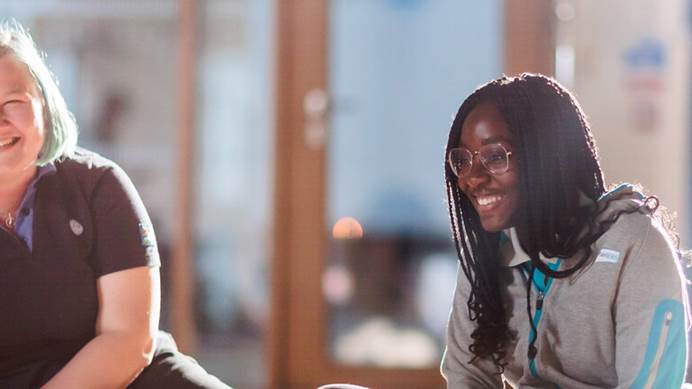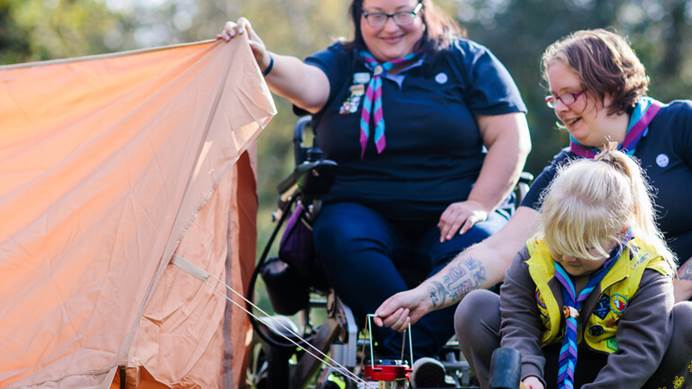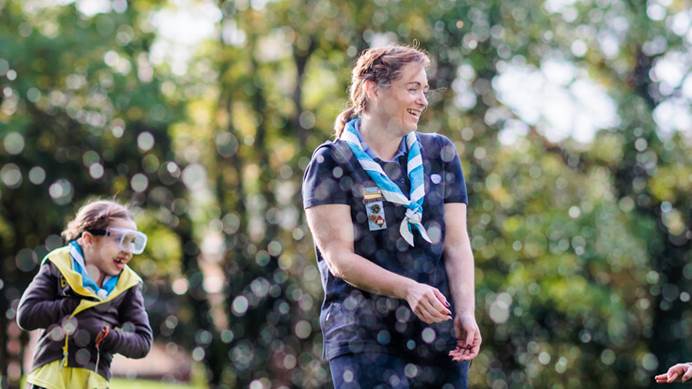Checking IDs for disclosure checks
What to do as a volunteer checking ID documents during a disclosure check
During the disclosure process, an existing volunteer will need to check the ID documents of the person undergoing the disclosure check.
When a new volunteer starts at a unit, it’s best for them to visit the unit a couple of times to make sure things are a good fit. It’s fine for the new volunteer to come along to unit meetings with young members as long as they’re supervised at all times. You can find more guidance in our recruitment and vetting policy and procedure on welcoming new volunteers.
Once a new volunteer has decided they’d like to continue volunteering at your unit, it’s time for them to do a disclosure check. The new volunteer should begin this process after no more than 4 visits to the unit. Find out why we carry out disclosure checks.
As the volunteer checking the IDs, what do I need to do?
Disclosure checks themselves are provided by a government agency - AccessNI in Northern Ireland, the Disclosure and Barring Service (DBS) in England and Wales, and Disclosure Scotland’s Protecting Vulnerable Groups (PVG) scheme in Scotland.
An existing volunteer who holds the role of an ID verifier in GO will need to check the original ID documents of the new volunteer during the disclosure process. We’ve put together some guidance for checking IDs during a disclosure check below. Once IDs have been verified, the resulting report is confidential. Only the volunteer who’s undergoing the check, the disclosure agency and the Girlguiding HQ disclosure and compliance teams will be able to see the information.
Who needs their ID documents checked?
Anyone starting a role in a unit such as unit helper, unit leader or unit administrator – or any other role that requires a disclosure check.
You can find out if a role requires a disclosure check using the role descriptions.
It’s required by law for anyone working directly with young people under the age of 18 to do an enhanced with child barred list disclosure check. For more information on why we do disclosure checks, see the recruitment and vetting procedure.
Everyone in a role that requires a disclosure check (outside of Scotland) will need to be rechecked every 3 years. In Scotland, your disclosure check won’t need to be rechecked.
Who can check ID documents?
If you’d like to check ID documents, you’ll need to be added as an ID verifier on GO. ID verifiers can be any volunteer who's over 18 and has a valid disclosure check. Check the help files in GO for more on how to add a role to an existing volunteer.
It's important that you don’t carry out disclosure checks for anyone who’s a member of your family - this includes people you’re directly related to, adopted family members and in-laws.
You also can’t carry out disclosure checks for someone you're in a relationship with, or someone who’s in a relationship with a member of your family. The same rules apply for providing a reference for someone - you can’t do this for family members, partners or partners of family members.
How do I check ID documents?
- Arrange to meet the volunteer at a place that’s convenient for both of you. This should be a public place with some privacy and access to the internet. Inviting them to a private home may make new volunteers feel uncomfortable – so if you can, meet at the unit meeting place or somewhere nearby.
- For England and Wales, if you’re completing ID verification for the first time, you’ll need to have received an email from the disclosure system with login information (be sure to check your spam). It’s a good idea to check in advance that you can log in each time that you complete a check.
- Make sure you’ll have at least 15 minutes to do the check without too many distractions.
- Introduce yourself and make sure you’ve explained the purpose of doing the check. You can find out more in our recruitment and vetting policy.
- When you access the disclosure system it will walk you through the steps. You’ll just need to enter some of the details from the ID documents provided - find out more by checking the GO help files.
- If in England or Wales: after you’ve verified and entered the document details, the person undergoing the check will need to enter some more personal details. This can either be done on the same device or you can generate a link so they can do it at a time that suits them.
- If in Scotland: after you’ve verified the ID documents you'll need to update GO to confirm that you've done so. Within 48 hours the person undergoing the check will receive an email from Disclosure Scotland with a link to access and complete their personal details.
- If in Northern Ireland: after you’ve verified the ID documents you'll need to update GO to confirm that you've done so. You will also need to provide the person undergoing the check with the organisation PIN that they'll need to enter to ensure their application is linked to Girlguiding. If you don’t know what PIN to use please contact Girlguiding’s disclosure team.
- We have guidance on supporting trans volunteers, refugees and asylum-seeking members with disclosure checks. Our disclosures team are also at hand to help.
What documents can be checked?
The government may change the ID requirements for a disclosure check at any time. This list is correct as of the date below, but be sure to double check with your local government website for any updates.
Updated April 2023
The number of documents needed depends on which ‘route’ is being followed.
Applicants require 1 document from document group 1 and 2 documents from document group 2. If the required number of documents can’t be met, applicants will be required to produce 5 documents from group 2.
List of documents accepted
Document group 1 - primary identity credentials
- A current valid passport (any nationality).
- A current photocard driving licence (full or provisional) UK, Isle of Man, Channel Islands or other EU country.
- Original (UK, Channel Islands and UK authorities overseas such as embassy or HM Forces) birth certificate (issued within 12 months of the date of birth).
- Biometric residence permit (UK).
- Adoption certificate (UK and Channel Islands).
Document group 2a
- Reissued (UK and Channel Islands) birth certificate (issued after 12 months of the date of birth).
- A current photocard driving licence (issued with a counterpart paper licence but it has not been presented).
- Marriage or civil partnership certificate (UK and Channel Islands).
- A current driving licence (old-style paper version) (accepted for DBS checks only).
- Firearms licence (UK and Channel Islands).
- HM Forces ID card (UK).
Document group 2b – financial or social history documents
- British work permit or visa (UK) (UK residence permit).
- Cards carrying the PASS accreditation logo (UK and Channel Islands).
- Letter of sponsorship from future employment provider (non-UK/non-EEA only – valid only for applicants residing outside of the UK at time of application).
- Letter from head teacher or college principal – (16- or 17-year-olds in full-time education).
- EU national identity card.
The following documents, which must have been issued within the past 12 months:
- P45 certificate statement (UK and Channel Islands).
- Council tax statement (UK and Channel Islands).
- P60 certificate statement (UK and Channels Islands).
- Mortgage statement (UK or EEA) – (non-EEA statements will not be accepted).
- Financial statement – such as pension, endowment, ISA (UK).
The following documents, which must be less than 3 months old:
- Bank or building society statement (UK and Channel Islands or EEA) (non-EEA statements will not be accepted).
- Bank or building society account opening confirmation letter (UK).
- Credit card statement (UK or EEA) (non-EEA statements will not be accepted).
- Benefit statement – such as child allowance or pension.
- 1 or 2 documents from central or local government, government agency or local authority giving entitlement (UK and Channel Islands) – for example from the Department for Work and Pensions, the Employment Service, Customs and Revenue, Job Centre, Job Centre Plus, Social Security.
- Utility bills such as electricity bill or statement, water bill or statement, gas bill or statement, telephone bill or statement (not mobile telephone).
Document group 1 – primary identity documents
- Any current valid passport.
- Biometric residence permit (UK).
- A current photocard driving licence (full or provisional) UK, Isle of Man, Republic of Ireland, Channel Islands, any EEA country.
- Original birth certificate (issued within 12 months of the date of birth) (UK, Isle of Man and Channel Islands including issued by UK authorities overseas).
- Original long form Irish birth certificate (issued within 12 months of the date of birth) (Republic of Ireland).
- Adoption certificate (UK, Isle of Man or Channel Islands).
Document group 2a – trusted government- or state-issued documents
- Reissued birth certificate (issued after 12 months of the date of birth) (UK, Isle of Man and Channel Islands or Ireland).
- Marriage or civil partnership certificate (UK, Isle of Man and Channel Islands or Ireland).
- HM Forces ID card (UK).
- Firearms licence (UK, Isle of Man and Channel Islands).
- Electoral ID card (Northern Ireland only).
- A current photocard driving licence (full or provisional) (All countries outside the EEA).
- A current driving licence (full or provisional) (paper if issued before 1998) UK, Isle of Man, Republic of Ireland, Channel Islands or any EEA country.
- Immigration document, visa or work permit (Issued by a country outside the EEA – valid only if the applicant is working in the country that issued the document).
Document group 2b - living and social history documents (issued within the last 3 or 12 months as indicated below)
- Mortgage statement (UK or EEA) (within last 12 months).
- Financial statement eg ISA, pension or endowment (UK) (within last 12 months).
- P45 or P60 statement (UK or Channel Islands) (within last 12 months).
- Land and Property Services rates demand (Northern Ireland only) (within 12 months).
- Council tax statement (Great Britain and Channel Islands) (within last 12 months).
The following documents, which must be less than 3 months old:
- Credit card statement (UK or EEA) (within last 3 months).
- Bank or building society statement (UK or EEA) (within last 3 months).
- Bank or building society statement (countries outside the EEA) (within last 3 months – branch must be in the country where the applicant lives and works).
- Bank or building society account opening confirmation letter (UK or EEA) (within last 3 months).
- Utility bill (not mobile phone) (UK or EEA) (within last 3 months).
- Benefit statement eg child benefit, pension. (UK and Channel Islands) (within last 3 months).
- Central or local government, government agency or local authority giving entitlement eg from the Department for Work and Pensions, the Employment Service, HMRC (UK and Channel Islands).
Must be valid:
- EU National ID card.
- 60+ or Senior (65+) SmartPass issued by Translink (Northern Ireland).
- yLink card issued by Translink (Northern Ireland).
- Cards carrying the PASS accreditation logo (UK, Isle of Man and Channel Islands).
- Letter from head teacher or further education college principal – for 16 to 19 in full time education – only used in exceptional circumstances if no other documents can be provided (UK).
- Letter of sponsorship from future employment provider or voluntary organisation – for applicants residing outside UK at time of application (non-UK or non-EEA).



